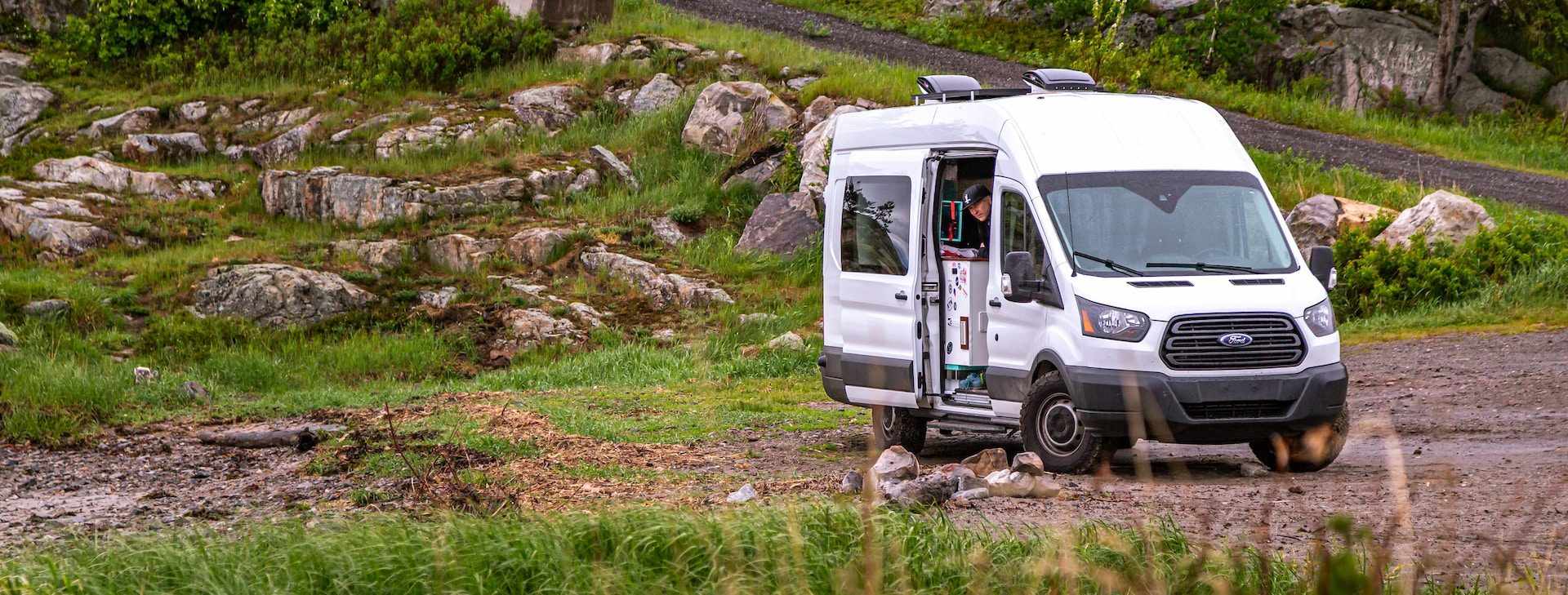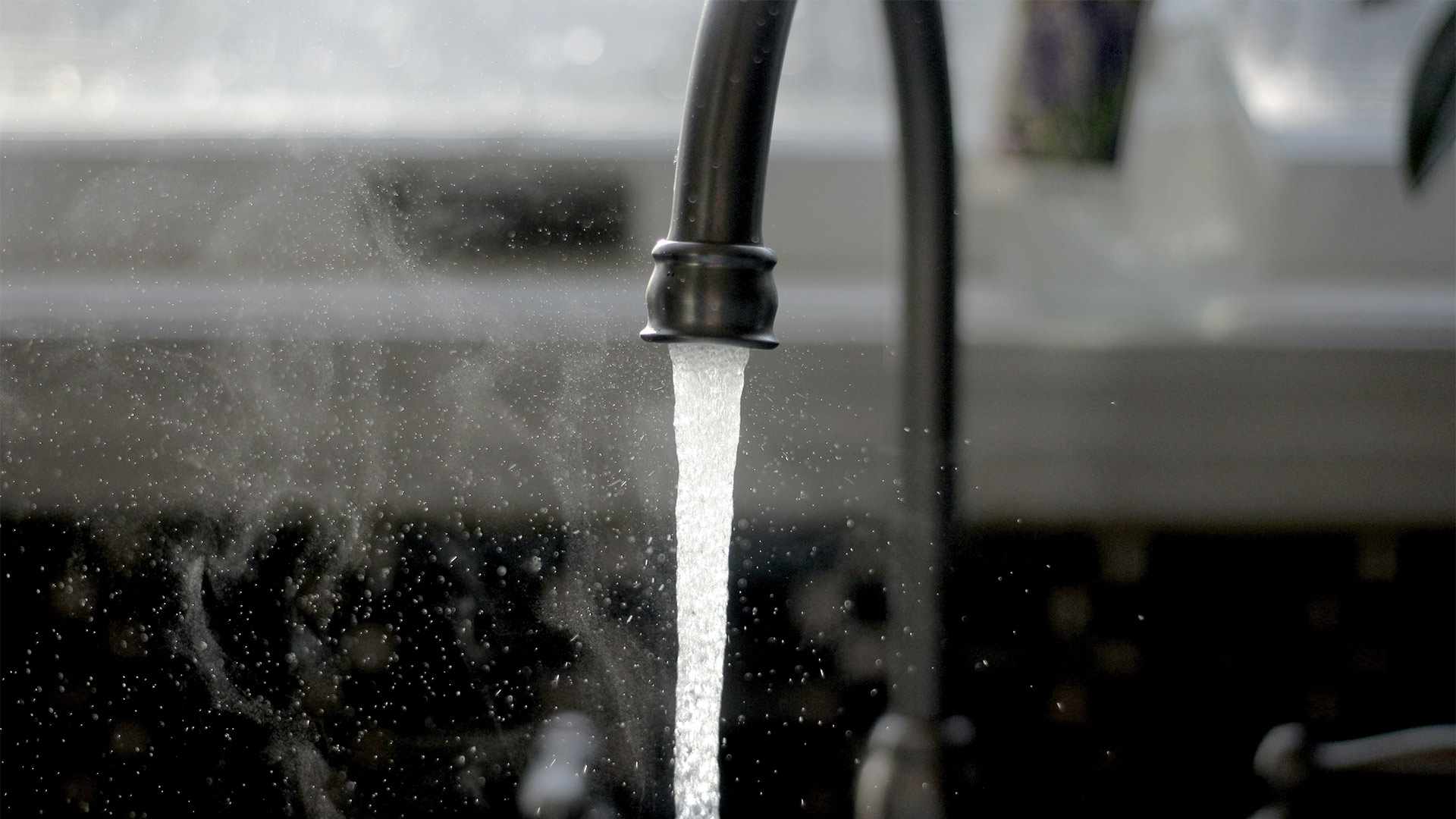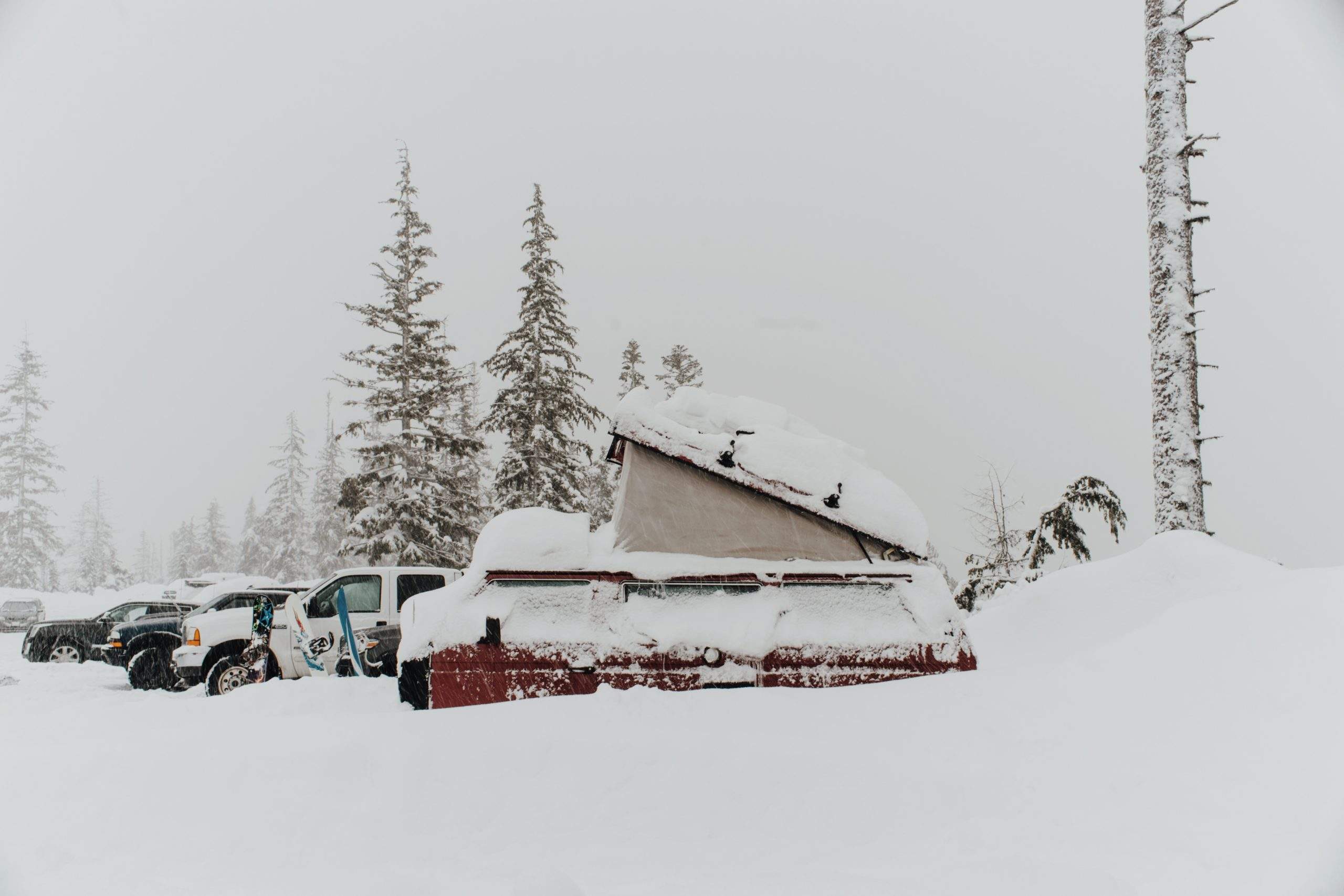‘Tis the season where the mercury starts dropping and RVers the world over begin to hunt for warmer pastures. After all, one of the best parts of owning or renting an RV is the fact that you can chase 70 degrees as it gets colder up north.
But what if cold weather camping is your jam? Or suppose you jumped into your RV so you can be close to a ski hill or other place that’s great for winter RV camping? Or what if you live in your RV full-time but work still requires you to be in a cold-weather spot?
Winter-Ready RVs For Rent Near You
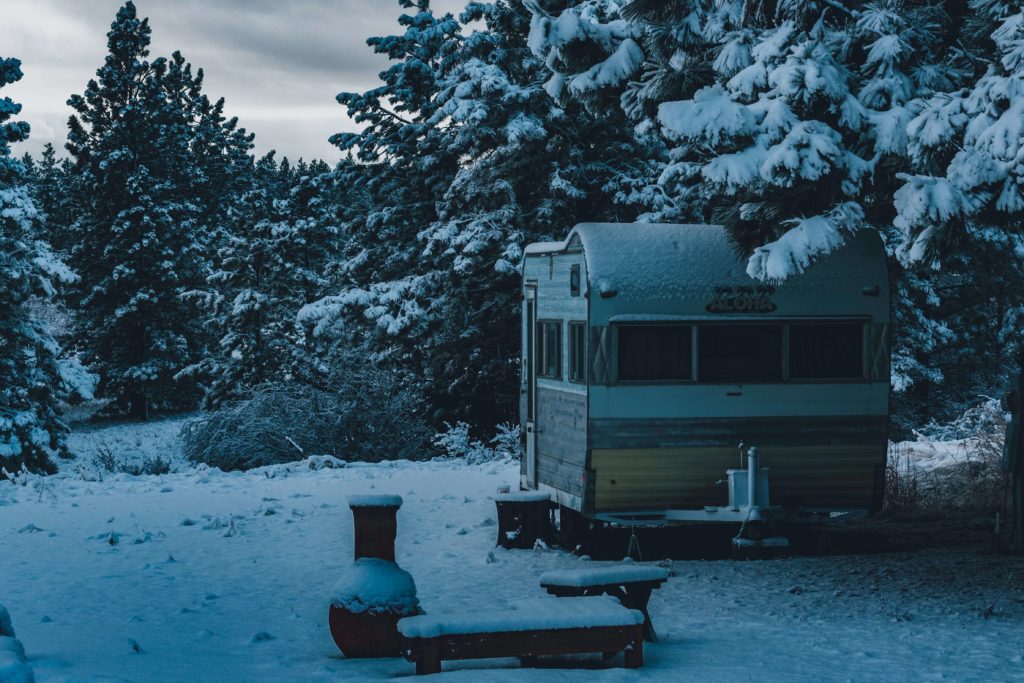
Whether you do winter RV camping by choice or by necessity, there are steps you’ll want to take to stay warm in your rig. That’s why we’ve put together this Complete Guide To Cold Weather Camping.
We want you to know exactly how to use your RV in the winter — how to shield it from mother nature, how to winterize and store it if you want to, and even how you can make money renting your rig to others in warmer parts of the country.
What is cold weather camping?
Cold weather camping could be defined as anytime you camp in your RV in the winter when the temperature is consistently below freezing. That’s because temps above freezing don’t usually bring with them the host of problems and considerations that full-on winter camping brings with it.
When temps dip below 32, that’s when you have to worry about freezing pipes, increasing heat needs, and cold — and complaining — family members.
Another consideration with winter camping in an RV is wind. Even if the temps are above freezing, winter weather can still bring cold winds. Cold winds can make RV camping in winter a tough proposition because the winds more easily penetrate RV windows and doors than in your house.
So why cold weather camp in the first place?
Because cold weather RVing can get you into some of the best places to hang out in your camper. You could live close to a ski hill for a fraction of the cost of a condo, you could hang right by certain national parks and have them nearly all to yourself, or you could just stay in an area you want to stay in despite mother nature’s wrath.
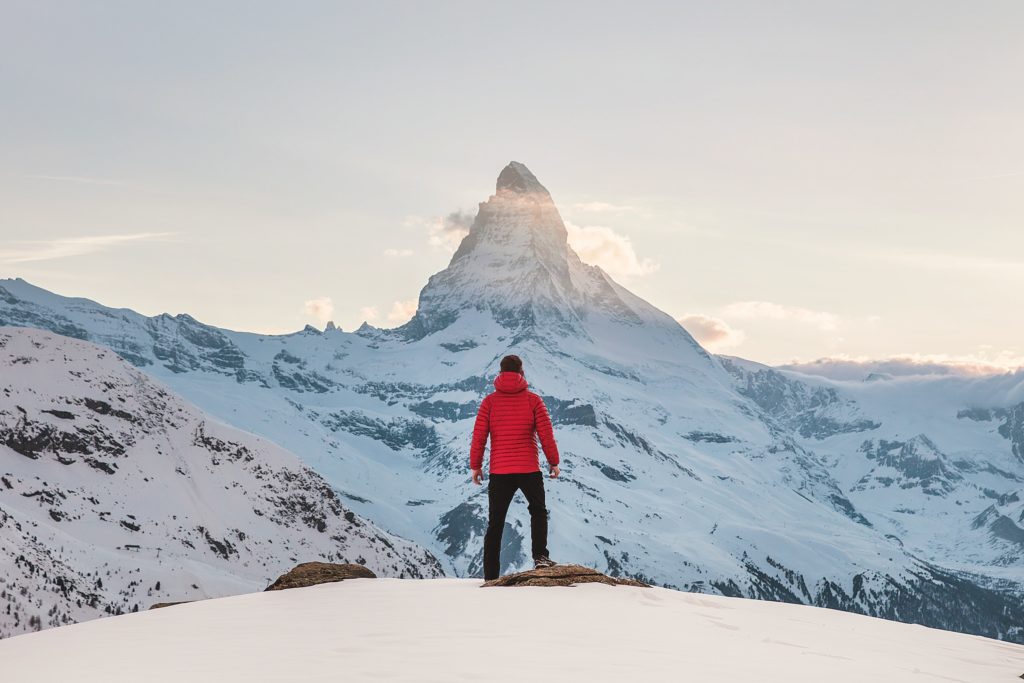
None of this means that RV camping in the winter has to be uncomfortable. There are ways to cold weather camp in a place you enjoy and still come home to a warm camper.
How to keep a camper warm in the winter
When it comes to keeping your camper warm in the winter, your first step is to determine what type of camper you have.
Generally speaking, campers will either be four-season or three-season. If a camper is four-season, it’ll usually be labeled as such. Four-season RVs are ready for winter camping because they feature things like heavy-duty insulation, heated water tanks, dual pane windows, and many other features to keep you warm while cold weather camping.
Here are several examples of winter-ready RVs.
Three-season campers — on the other hand — are designed for camping during milder seasons and climates. While you technically can winter camp in a three-season camper, it’s a much more challenging process.
Either way, you’ll want to take the following steps to make sure you’re ready for cold-weather RV camping:
- Add to your insulation — Even if you have a four-season rig, you can take things a step further with the following:
- Use clear marine vinyl or Reflectix to create an additional insulation barrier on your RV windows.
- Cover your RV with thick rugs for an extra layer of floor insulation.
- Insulate your RV roof vents.
- Install heavy drapes that insulate your windows against the cold.
- Check to ensure all doors and windows are well sealed and replace old seals/weather stripping as needed.
- “Skirt” your winter camping trailer — A substantial portion of heat loss in RVs happens when cold winds blow underneath them. That’s why purchasing or fabricating an RV skirt to seal your RV’s underside will help you stay toasty while using an RV in the winter.
- Use multiple forms of heat — When camping in cold weather, your RVs central heating system can’t always keep up on its own. That’s why it’s a great idea to supplement your camper’s internal propane heater with an electric space heater or propane buddy heater.
- Pack accordingly — Blankets, thermal undergarments, and thick socks go a long way in keeping the family happy while cold weather camping.
- Use fire — Campfires are fun at any time, but they are a necessity for cold-weather camping. By understanding how to start and manage the perfect campfire, you’ll help everyone stay toasty during winter RV camping.
RV camping in the winter: Maintain your heater BEFORE it gets cold
RV propane heaters haven’t changed much since the early days of RVing, but they can still be one of the peskiest RV appliances to keep running.
And we can almost promise you that when your RV heater goes out, it won’t be on a 60-degree day in the middle of the week — it’ll be on the coldest night of the year. In the middle of a holiday weekend. When you’re hundreds of miles away from civilization.
To avoid this nightmare while winter camping, plan to start every winter season by having your RV’s heater fully tested and serviced by a pro.
How to keep RV pipes from freezing while camping
Keeping water flowing — and unfrozen — is your most important winter camping mission, apart from staying warm yourself.
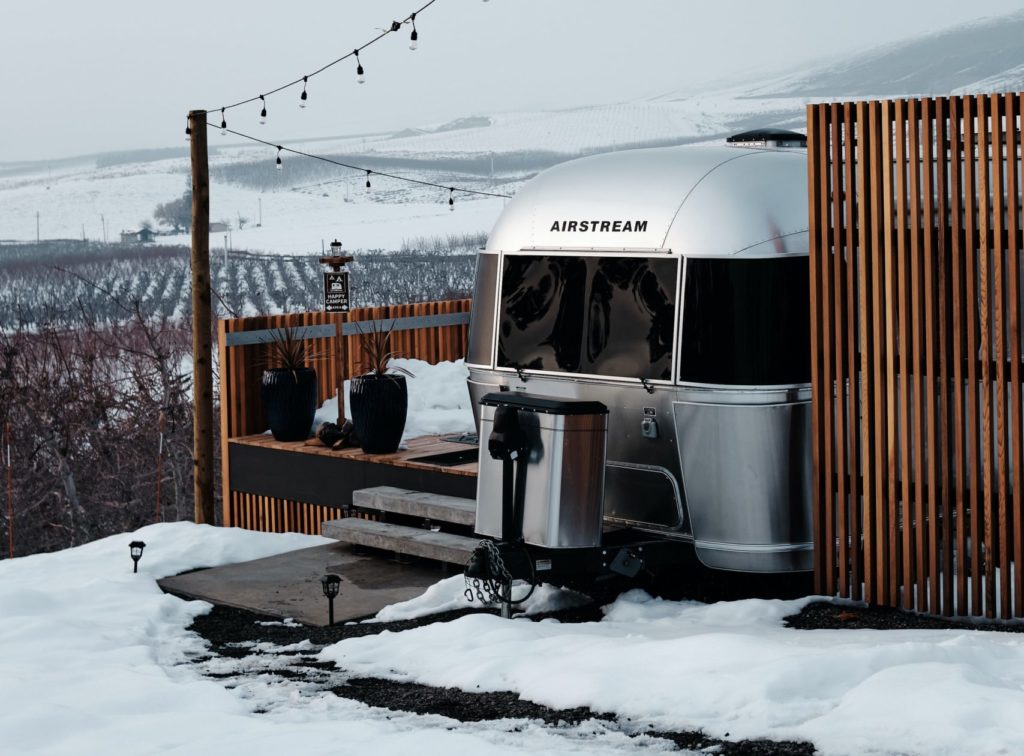
You should take these precautions to keep RV pipes from freezing:
- Use a heated hose — This will keep water flowing through your city water connection.
- Use your RV’s internal fresh water tank — If you’d rather not use a heated hose or aren’t connected to city water, your RV’s internal fresh water tank is a great option.
By keeping your RV heated, you’ll also help keep your internal fresh water tank thawed. The downside is you’ll have to go out in the cold once in a while to refill your fresh water tank! - Practice strategic dumping — Leaving your black and grey tanks open is generally not a good plan while cold weather camping because those fluids can freeze in your sewer hose.
Instead, dump only when your tanks are nearing full so your camper’s internal temperature can help keep fluids thawed. - Antifreeze in black/grey tanks — Put a small amount of non-toxic RV antifreeze down your toilet and sink drains to help keep tanks from freezing. Remember to add more antifreeze each time you dump the tanks.
- Use low-temp heat tape on hoses — Heat tape can be easily wrapped around external hoses to keep them thawed while using your RV in the winter.
- Let your water drip — We don’t love suggesting this one because it wastes water, but — if you’re in a pinch — one way to keep RV pipes from freezing is to keep water flowing. This is because running water freezes much more slowly than sitting water.
NOTE: Don’t use this strategy while boondocking or you’ll drain your fresh water tank and fill your grey water tank in a single night!
How to prepare for a winter RV road trip
What to pack
Now that your RV is ready for winter camping, it’s time to prepare your family for the adventure. Here is what you want to pack in your RV for cold-weather camping:
- Sleeping bags and thick blankets
- Breathable underlayers — Such as thermal underwear that wick away moisture.
- Thicker mid-layers — Fleece or wool sweatshirts, for example.
- Stocking hat and warm socks
- Gloves
- Waterproof outer layer
- Headlamp and lantern — Winter camping means it’ll be getting darker sooner.
- Shovel
- Tire chains
- Extra propane tanks — Because the last thing you want is to wake up in the middle of the night to cold air blowing out of your heater.
Where to go
Many RVers opt for winter camping in southern destinations because those winters are far less harsh. While you’ll still need to take certain precautions to keep your camper warm in the winter, these are the best states for warm winter camping.
On the flip side, if you plan to chase the snow, here are some of the best sorts of places to go:
- Utah’s Mighty Five — Utah’s five national parks meander through the state and feature epic canyons, majestic mountains, and sprawling deserts. Winter hiking opportunities also abound in southwestern states like Utah.
The areas surrounding Utah’s parks are terrific for cold weather camping and hiking because you can see snow and snow-capped mountains without freezing your tush off — usually. - Ski bumming — If you’ve decked out your RV to be the ultimate cold-weather camper, ski resorts can be a great place to winter camp.
This style of winter camping is especially doable at ski resorts in Colorado, Wyoming, Utah, and even Northern New Mexico. - Eastern Tennessee/Northern Georgia/Western S. Carolina — This area is wonderful because you can experience snow in the Appalachians, explore Smoky Mountain National Park when few people are there, and enjoy southern hospitality as you cold weather camp.
As a bonus, winters here are relatively mild, so you’ll get snow without the extreme cold (usually). - Pacific Northwest — The northwest coast is known for mild winters, light snow, and ocean fun. Even during the winter, places like the Oregon coast are fun spots for cold-weather camping.
How to stay safe while cold weather camping
Cold weather camping brings with it a few extra precautions.
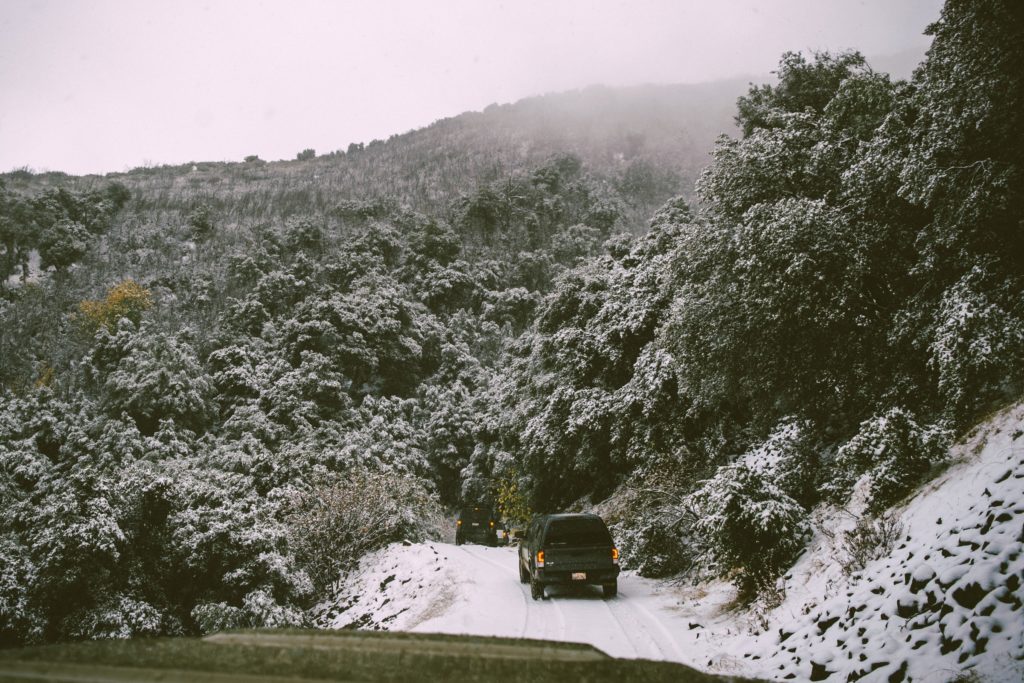
First, keep an eye out for icy conditions — especially black ice. Ice is a sticky situation for any vehicle, but it can be especially problematic in a winter RV.
Second, be sure to have an emergency RV kit with you at all times in case you get stuck on the side of the road.
Finally, be sure you always have extra water, food, and blankets on board at all times in case you get stuck in cold weather.
Winter Ready RVs For Rent Near You
Cold Weather RV Cooking Tips
Cooking in your RV during winter can be a delightful experience with the right approach. Here are some tips to make it easier:
- Hearty Ingredients: Focus on warming, filling meals. Ingredients like beans, lentils, root vegetables, and grains are not only nutritious but also comforting.
- One-Pot Meals: Use slow cookers or Instant Pots for easy, minimal cleanup. Soups, stews, and casseroles are perfect for cold weather.
- Pre-Prep Meals: Prepare meals at home and freeze them. Just reheat in your RV for a warm meal without the fuss.
- Utilize Your Oven: If your RV has an oven, bake casseroles or bread to add warmth to your space and create delicious meals.
- Stay Stocked: Keep your pantry stocked with essentials, ensuring you have everything you need on hand, even during snowstorms.
These strategies will help keep your meals enjoyable and cozy while RV camping in winter!
How to winterize your RV
While cold-weather camping is appealing to many RVers, it’s not for everyone. Sometimes you just want to tuck your RV away for the winter and come back to it when the weather is right.
Storing your RV for the winter can be a great option. If you choose to do this, you should take the following steps to prep your RV for cold-weather storage:
- Drain your water lines via your low point drain — Consult your owner’s manual to find the location of your low point drain. Once you find it, open it to drain all the water from your lines.
- Drain your water heater and bypass it — your owner’s manual will tell you how to do this. It’s very important that you allow the water in your water heater to cool before you do this so you don’t get burned!
- Pump non-toxic RV antifreeze or air through your water lines
- Store your RV batteries in a climate-controlled location — RV deep-cycle batteries can get ruined if they’re exposed to extreme heat or cold. You can extend their life by storing them in a temperature-regulated place.
- Pour a bit of non-toxic RV antifreeze down your drains — Put a bit of this type of antifreeze down all sink drains to protect the P-traps. You should also leave a bit in your toilet bowl to protect those parts.
- De-winterize your RV in spring/summer before you head back out.
Winter RVing FAQ
Have more questions about winter camping in an RV? The answers below might help!
Can I use my RV’s water system in winter?
Yes, but you’ll need to use a heated water hose to prevent freezing. Additionally, keep your RV heated, and consider adding RV antifreeze to the plumbing system if temperatures drop significantly.
What are some tips for driving in snowy conditions?
Use winter tires for better traction, maintain a safe speed, and keep a safe distance from other vehicles. Always carry an emergency kit, including blankets, snacks, a flashlight, and a first aid kit.
Is it safe to camp in the winter?
Yes, with proper preparation and gear, winter RV camping can be safe and enjoyable. Always monitor weather conditions and ensure your RV is well-equipped to handle the cold.
How do I maintain my RV in winter conditions?
Regularly check for ice accumulation on the roof, inspect seals and seams for leaks, and keep your tires properly inflated as cold weather can affect pressure. It’s also wise to check your battery and propane levels frequently.
These FAQs cover essential aspects of winter RVing, helping ensure a comfortable and safe experience on the road during colder months!
Want to rent out your rig this winter?
Winter RV camping can be a fun journey if it’s your jam. But what if you’d rather make money with your camper during the winter?
Many parts of the U.S. still experience high demand for campers during the winter and there are many ways you can connect with individuals who want to rent RVs in these climates. Moving your RV south for the winter could be a great option for you if you were otherwise planning to store your camper for the winter.
While it might seem intimidating to have your RV rented out to strangers in a faraway place, there are many ways you can have peace of mind while your RV makes money as a winter camping rig.
For example, you could offer your RV for rent on consignment via one of our professional owners living in warmer winter climates. These Outdoorsy Pros will handle all the heavy lifting of renting your RV in the winter while you reap the rewards. You’ll also benefit from Outdoorsy’s industry-leading insurance offering $1 million liability + comprehensive and collision coverages while your camper is rented out.
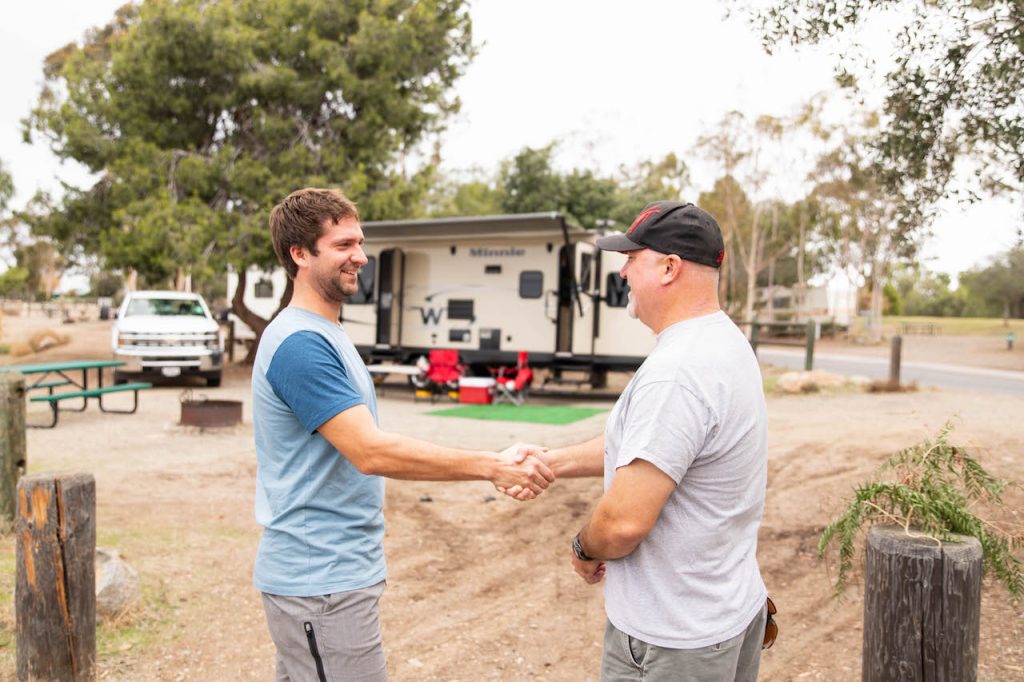
Renting out your rig for cold weather camping won’t cost you anything. Outdoorsy simply shares a percentage of the rental fee when your camper gets rented in the winter. So — if you find yourself in a frigid winter climate — putting your RV for rent down south can be a much better option than paying for storage for 6+ months.
Hit the winter roads
Cold-weather camping is a tried and true path that many have trod. While it’s not necessarily for everyone, the bottom line is that you have many options for your RV in the winter — from storing it to camping in it to making money with it. No matter which way you choose to use your RV in the winter, it’s always good knowing that cold weather doesn’t necessarily have to stop your camping plans.
